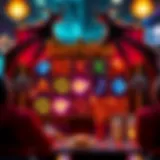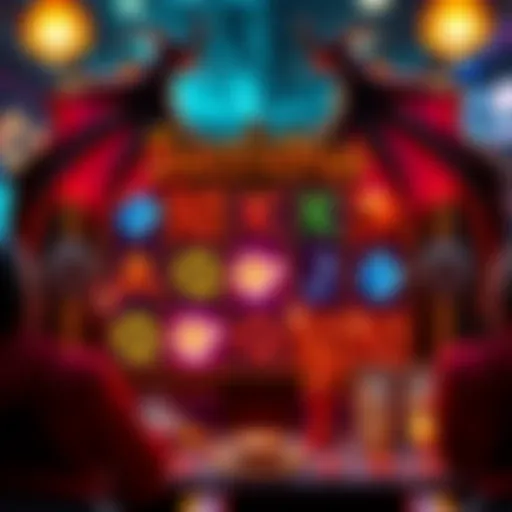Exploring the Depths of Demon Deals in Anime
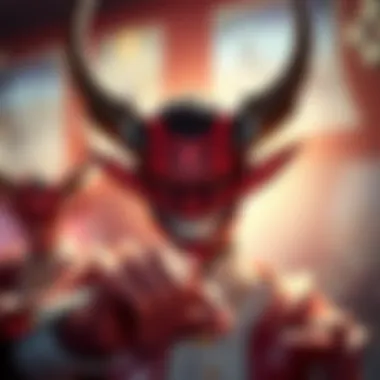

Intro
Demon deals in anime serve as a captivating motif, intertwining the threads of morality, humanity, and the supernatural. These intricate agreements, often struck with malevolent entities, bring forth a series of ethical dilemmas and character transformations. As we embark on this exploration, we'll delve into how these contracts shape narratives and provide deeper meaning within the anime landscape.
Characters often face pivotal choices when engaging with demons, bringing their desires, fears, and consequences to the forefront. How do these deals influence the plot and character development? Why do some venture into such precarious bargains, while others resist? In answering these questions, we shed light on the broader cultural and philosophical themes entwined with such portrayals.
Following sections will highlight essential anime that showcase these deals, offering insights into their thematic relevance and character interactions. As we peel back the layers of these compelling agreements, we will uncover the multifaceted implications of dealing with demonic forces in storytelling.
By the end of this article, you’ll not only gain a comprehensive understanding of demon deals but also appreciate the artistry behind them in anime narratives. Prepare yourself for an intriguing journey into the dark yet fascinating corners of this genre.
Preface to Demon Deals
In the realm of anime, demon deals present a compelling narrative device that resonates deeply with audiences. These intriguing contracts between characters and demonic entities are not merely plot devices; they delve into the psychological and moral dilemmas that define human existence. The importance of discussing demon deals in this context cannot be overstated. They serve as a reflection of personal ambitions, existential fears, and the lengths one might go to in search of power or solace.
Demon deals often encapsulate themes of sacrifice, greed, and the ultimate cost of one's choices. By exploring these themes, fans gain insight not only into character development but also into broader narratives that echo within society. For many viewers, these deals prompt introspection about their own lives, decisions, and the consequences those choices may hold.
The intricacies surrounding demon deals can also enhance our appreciation of cultural influences within anime. They draw from varied historical strands and folkloric traditions, allowing for a rich tapestry of storytelling that invites analysis and conversation. Understanding the definitions and historical contexts of these deals provides a foundation for deeper engagement with the series and characters involved.
The exploration of these agreements leads us into a world where the supernatural intersects with the everyday, illuminating the struggles of the protagonists and antagonists alike.
"Demon deals are fascinating not just for their supernatural elements, but for their poignant commentary on human desires and ethical boundaries."
By contextualizing this phenomenon within anime, we will uncover diverse interpretations that enrich the viewing experience. Furthermore, examining the character interactions around these deals allows one to appreciate the nuanced storytelling that anime often delivers, making the topic worthy of thorough exploration and analysis.
Definition of Demon Deals
Demon deals can be characterized as agreements struck between a character and a demon or demonic entity. Typically, these contracts stipulate that the character receives something of great value—like power, knowledge, or even a loved one’s well-being—in exchange for something equally significant, often culminating in a personal sacrifice. This could be a part of the character’s soul, memories, or even their very essence. What sets these deals apart in anime is their depiction as complex and often morally ambiguous arrangements.
The very essence of these deals revolves around the notion of trading one's humanity for a fleeting advantage. Within many narratives, characters who enter into these contracts are often depicted as desperate or ambitious individuals seeking quick resolution to their problems. Anime like Devilman Crybaby and Puella Magi Madoka Magica take this concept a step further, embedding the psychological consequences of these deals into the character arcs, raising the stakes significantly.
Historical Context in Folklore and Mythology
Throughout history, the motif of pacts with demons can be traced back to several cultural folklore and mythological traditions. Various cultures have documented stories of individuals striking deals with supernatural beings, often emphasizing the moral implications of such choices.
For example, in European folklore, the tale of Faust illustrates the archetype of the individual who, desperate for knowledge and experience, makes a deal with the devil—Mephistopheles. This narrative has inspired numerous adaptations, influencing contemporary interpretations of demon deals in anime. Similarly, ancient mythology from cultures worldwide, such as Japanese folklore with its famed yokai, captures the essence of supernatural contracts that often result in dire consequences.
These historical and cultural narratives provide a rich backdrop against which anime writers draw inspiration. The adaptation of these age-old themes into modern storytelling showcases the timeless relevance of moral dilemmas faced when entering into agreements that challenge the boundaries of right and wrong.
Demon Deals in Anime: An Overview
Demon deals play a central role in many anime narratives, serving as a powerful narrative device that shapes character arcs and plotlines. These contracts with demonic entities often highlight significant themes such as ambition, moral conflict, and the cost of desire. Understanding the intricacies of demon deals enhances our appreciation of how characters navigate their choices and the consequences that follow. This section digs into the essential aspects of demon deals in anime and the impact they have on storytelling.
Common Themes and Motifs
Demon deals often revolve around several recurring themes and motifs. At the forefront is the theme of sacrifice. Characters enter into these agreements usually hoping for their deepest desires—be it power, revenge, or even love—but the ensuing journey tends to demand a price that tests their very essence. This price isn't just material; it's oftentimes emotional or spiritual, leading to poignant character development.
Another prevalent motif is the interplay of temptation and morality. The enticement of power or fulfillment frequently blinds characters to the potential repercussions of their choices. For instance, in the anime "Fate/Zero", characters grapple with their ideals versus the morally gray offers made by their demonic counterparts. The constant tug-of-war between craving their goals and facing the darker side of those ambitions creates a rich narrative landscape that engages viewers on multiple levels.
Conflict is another recurring element, where characters must confront their inner demons, literally and figuratively, as they venture deeper into these contracts. The ongoing struggle often leads to a fascinating exploration of human nature: our desires, fears, and ultimate quests for identity.
"In every pact with a demon, there lies a reflection of our deepest selves, revealing what we are willing to sacrifice for our desires."
Variety Across Different Genres
The portrayal of demon deals transcends genres, adapting to fit the unique tonal and thematic needs of each narrative. In darker series like "Berserk", the deals illustrate a horrific descent into madness and despair, blending horror elements with existential questions about fate and free will.
On the flip side, lighter series such as "Little Witch Academia", incorporate demonic contracts in a whimsical context, where characters learn valuable life lessons through their interactions with otherworldly entities. Here, the demon might not be a malevolent force, but rather a guide, encouraging growth and transformation within the protagonist.
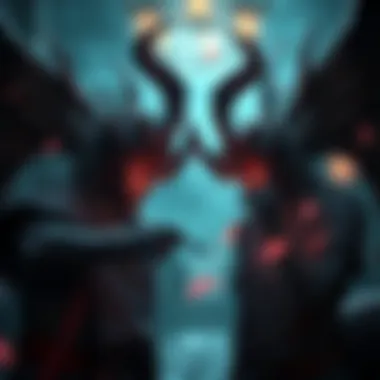

Demon deals are not confined to the action or horror genres; they find their way into romantic comedies, where a budding relationship may hinge on quirky contracts with supernatural beings, adding layers of complexity to character dynamics. This variety ensures that while the same fundamental concept drives the plot, it adapts to resonate with diverse audiences, making the theme of demon deals a versatile narrative tool in anime storytelling.
Notable Anime Featuring Demon Deals
In the realm of anime, demon deals hold a significant position in narrative development and character evolution. These agreements, often shrouded in moral ambiguity, enrich plotlines, and deepen the exploration of psychological conflicts. Examining notable anime that feature such deals allows fans to engage more critically with the stories, providing insights into characters' motivations, struggles, and the often dire consequences of their choices.
Popular Series and Their Portrayals
When it comes to anime showcasing demon deals, several series have garnered attention and acclaim. "Fate/stay night" is a prime example where characters form contracts with powerful heroic spirits, known as Servants. Each contract underscores personal ambitions and the high stakes involved in the battle for the Holy Grail. Similarly, "Blue Exorcist" delves into the protagonist Rin Okumura, who unwittingly makes a pact with Satan. His journey highlights the internal conflict of embracing one's origins while attempting to forge a path of redemption.
In "Puella Magi Madoka Magica," viewers witness how young girls enter contracts with a mysterious creature named Kyubey, trading their normal lives for magical powers. This series flips the script on traditional magical girl tropes, revealing the dark undertones of sacrifice and the unspoken consequences of their wishes.
Furthermore, "Demon Slayer: Kimetsu no Yaiba" showcases characters facing demons as they pursue their quests. While not direct deals, the thematic elements of bargaining with one’s fate—dealing with loss, vengeance, and the complexities of human-non-human relationships—echo the intricacies of demon deals. The series emphasizes emotional stakes, illustrating how such encounters redefine moral boundaries.
Various anime present these themes, offering a tapestry of narratives that showcase deals with demons and the unparalleled tension that emerges from these arrangements. As these stories unfold, the contracts often serve as a double-edged sword, symbolizing a character’s inner turmoil and aspirations, set against a backdrop of inevitable consequence.
Character Studies: Protagonists and Antagonists
The characters who engage in demon deals often reflect contrasting themes of ambition and morality. Protagonists like Shinichi Izumi from "Parasyte: The Maxim" deal with the horror of merging human characteristics with those of parasitic demons. This fusion creates a nuanced character arc, showcasing the struggle between retaining humanity while facing existential threats.
In contrast, antagonists like Mephisto Pheles from "Blue Exorcist" provide a compelling study of moral ambiguity and devilish charm. His manipulations add layers to the narrative, challenging protagonists to confront the darker sides of their own natures. In many cases, the protagonists are faced with choices that blur the lines between good and evil, reflecting the complexity of human decisions when dealing with ultimate power.
These character journeys not only drive the plot but also engage viewers in a broader philosophical discussion about the nature of desire, sacrifice, and the price one is willing to pay for power. Each deal encapsulates a story within a story, revealing the interwoven destinies that emerge from what could be deemed as trivial bargains.
Understanding these notable anime and their representations of demon deals allows for a deeper appreciation of the medium. They challenge our perceptions of morality, choice, and consequence, encouraging viewers to ponder: what lines would you cross for your heart's desire?
The Psychology Behind Demon Deals
Demon deals in anime do not merely serve as plot devices. They delve deep into the human psyche, tapping into fears, desires, and moral quandaries that resonate with viewers on a personal level. These transactions often reflect characters’ inner struggles, revealing how desperation can lead one to make choices that clash with their ethical beliefs. By examining the psychology behind these deals, we see how they not only drive the narrative forward but also serve as mirrors to our own human experiences, navigating through themes of ambition, sacrifice, and the search for purpose.
Motivations of Characters Entering Deals
Characters in anime often enter into pacts with demons out of desperation or an overwhelming desire for power. For example, consider Shinra Kusakabe from Fire Force who seeks abilities to fulfill personal goals and protect those he cares about. But it’s not just personal gain that motivates them; sometimes they seek redemption or the righting of past wrongs. The underlying themes can be boiled down to a few key motives:
- Desperation: Characters often find themselves in situations where the stakes are high, leading them to pursue any advantage, no matter the cost.
- Ambition: A thirst for power or recognition can prompt characters to make ill-advised agreements. In Blue Exorcist, Rin Okumura’s quest to become a strong fighter drives him to strike a deal with demonic forces.
- Love and Loyalty: Characters may engage in these deals to save loved ones or out of unwavering loyalty. When Yato in Noragami agrees to a deal concerning his past, it highlights the lengths he would go for those he cares about.
"Characters will often find that their desires can come at a higher price than they ever imagined. "
Consequences and Moral Dilemmas
The ramifications of entering these demonic deals often lead to significant moral dilemmas that challenge both characters and viewers alike. Themes of lose of autonomy, guilt, and the retraction of one's humanity often dominate the narrative landscape once such agreements are made.
- Loss of Control: Deals frequently come with unexpected strings attached. A character may find that the demon wields control over their fate, leading to crippling consequences. In Fate/Zero, Kiritsugu Emiya’s decisions showcase how power can lead to moral decay and a loss of self.
- Guilt and Regret: These feelings are prevalent when characters confront the true costs of their agreements. When one trades a piece of their soul or a significant choice, a lingering sense of guilt often follows. Aki Hayakawa from Chainsaw Man grapples with this guilt constantly as he deals with his demon contracts throughout the series.
- Isolation: Those who deal with demons might find themselves ostracized from society. This isolation can lead characters to spiral into darker paths or seek redemption in tragic ways.
The entanglement of desires and the repercussions of one’s actions create a rich tapestry of storytelling that not only highlights the dangers of succumbing to temptation but also explores the nuances of personal conflict, making the resultant narratives in anime both engaging and thought-provoking.
For more insights into the moral implications of such themes, consider sources like Britannica for scholarly perspectives, or delve into discussions on platforms such as Reddit where anime enthusiasts dissect character motivations and repercussions.
The Role of Demons in Character Development
Character development in anime often finds itself intertwined with supernatural elements, and demons serve as potent catalysts for change. This section highlights how demon deals can propel character transformation, revealing hidden depths and encouraging growth through adversities faced along the way. In narratives that delve into the complex relationship between human desires and demonic influences, it becomes apparent that these encounters are not merely plot devices, but instrumental forces shaping character arcs and their interactions.
Demon as a Catalyst for Change
The instances where characters engage in deals with demons particularly illustrate significant moments of transformation. These agreements often embody a character’s deepest desires or shortcomings, thus functioning as a trigger for self-exploration. When a character, say, Sasuke from Naruto, decides to pursue power through underhanded means, it isn’t just about achieving strength; it involves a profound journey into his psyche. His deal catalyzes both personal and interpersonal dynamics, leading to confrontations and revelations that would otherwise remain buried.
These shifts in characters can represent moral complexities. For example, consider the character Light Yagami from Death Note. He begins as an idealistic youth, but as he enters into a symbiotic relationship with the Shinigami Ryuk, it ignites an insatiable hunger for control and superiority. His initial intentions disintegrate under the weight of ambition, showcasing how demonic influence can serve as a catalyst, morphing straightforward decisions into spirals of ethical quandaries.
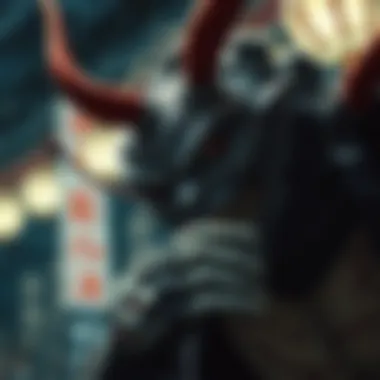

Beyond personal ambitions, demons also unveil vulnerabilities. The protagonist of Devilman Crybaby, Akira Fudo, encounters demons that reflect both his inner conflicts and societal challenges, forcing not only self-reflection but reshaping his identity as he grapples with his dual nature. The existence of demons in his life brings forth an opportunity for drastic character evolution, where his fears and uncertainties fuel a battle for his humanity.
Conflict and Resolution
Entering into a deal with a demon inherently sets the stage for conflict. Characters often find themselves grappling with the ramifications of their choices, leading to a series of escalating confrontations. For instance, in Fate/Zero, the conflict between various Servants is tied deeply to the desires of their masters. The frustrations and divergences in goal orientation result in confrontations not just external, but within the characters’ very selves.
Through these conflicts, resolution becomes essential. The journey of a character like Shinobu Oshino in Bakemonogatari becomes a compelling illustration of this. After making a pact with the oddity, Shinobu undergoes numerous confrontations that reveal layered complexities and ultimately lead to moments of resolution. The resolution often comes at a cost, mirroring the sacrifices required in forging demon deals. The reconciliation of one’s desires against the backdrop of consequences brings closure that can be both satisfying and thought-provoking.
Fostering conflict and resolution within character development mirrors the broader human experience, where desires often collide with moral implications, thereby reflecting real-world dilemmas faced by individuals.
"Demons reveal not just the strength of a character, but also their fragility, embodying the internal struggles each individual faces."
For further insights on the significance of supernatural elements in character evolution, readers may find these resources useful: Wikipedia, Britannica and discussions on Reddit.
Symbolism of Demon Deals
The symbolism behind demon deals in anime serves as a profound exploration of power dynamics, personal agency, and moral consequences. They often reflect the human condition, revealing the intricate layers of desires and fears that reside within each individual. The essence of these deals is manifest in the manner characters engage with demonic entities, often embodying universal themes of temptation and the struggle for control over one's destiny.
Exploration of Power and Control
In many anime narratives, demon deals are not simply contracts but are loaded with the symbolism of power and control. Characters often seek out demons during moments of desperation or ambition, revealing their inherent powerlessness in the face of life’s challenges. For instance, in Fate/Zero, the protagonist Kiritsugu seeks a contract with a spirit to gain power. Here, the demon symbolizes both the solution and the underlying threat—while offering power, it inherently demands something significant in return, which echoes the real-life notion that power often comes with strings attached.
The emotional weight of these agreements enhances the viewer’s understanding of the character's journey. It lays bare how characters may relinquish control over their moral compass for the sake of immediate gratification or success. This complex relationship raises questions: What are the costs associated with climbing the ladder of power? Is it worth the toll on one’s soul? Such themes keep audiences engaged; they resonate with viewers who understand that every decision can lead to unforeseen consequences.
"In the realm of demon deals, power and control are paradoxical; one often comes at the expense of the other."
Life Choices and Sacrifices
Life choices and sacrifices are universal themes portrayed vividly through the lens of demon deals in anime. Characters are frequently faced with difficult decisions that encapsulate their values, desires, and, ultimately, their humanity. For instance, in Akame ga Kill!, a central character makes a fateful deal that places not just their life but also their emotional ties on the line. The symbolism here is striking—the deal forces characters to confront their desires and the painful reality of what they may need to sacrifice to achieve them.
The phrase "you can’t have your cake and eat it too" applies deeply in these narratives. Characters who think they can manipulate fate often find themselves trapped in a cycle of regret, showcasing how every choice yields a sacrifice. Whether it’s a loss of innocence, relationships, or even humanity, demon deals encapsulate the harsh realities of life’s decisions. With each interaction with a demon, the characters’ motivations unfold, allowing viewers to empathize with their struggles while recognizing the intricate balance of choice and consequence.
Through this exploration of life choices, anime creators craft powerful narratives that challenge viewers to reflect on their decisions in the real world. Thus, the symbolism of demon deals serves not just as a plot device but as a mirror reflecting one’s own life choices and the sacrifices they entail. It is this depth that engages fans and fuels discussions about morality and personal integrity within the animated realm.
By tapping into these complex themes, anime create a dialogue that resonates with audiences across different cultures and backgrounds, illustrating how deeply intertwined our lives are with the notions of power, control, and the sacrifices we are willing to make for our desires.
Demon Deals and Cultural Reflections
Demon deals in anime are not just fantastical elements; they mirror deeper societal values, fears, and ethical quandaries rooted in culture. This section delves into the intense interplay between these diabolical contracts and the cultures they originate from, highlighting how traditional beliefs, societal changes, and global perceptions shape the narrative framework of their portrayal.
Influence of Japanese Culture
In Japanese culture, demons, or oni, have a rich, multifaceted history. Far from being purely malicious entities, oni embody chaos and serve as cautionary figures in folklore. When anime incorporates demon deals, it does not merely draw on these supernatural elements for shock value but rather uses them to channel traditional beliefs into contemporary narratives.
The influence of Shinto and Buddhism is profound; both religions include dimensions of moral introspection and consequences tied to human actions. Demon deals often present characters with life-altering choices, reflecting karmistic cycles where actions and intentions ripple through life's tapestry. Through these deals, anime often presents a warped mirror showing the consequences of human emotions—greed, ambition, and despair.
In series like Kyoukai no Kanata, we see how characters are forced to confront the shadows of their desires. Each engagement with a demon embodies a struggle not just of good versus evil but of internal morality against societal expectations. These themes resonate strongly with audiences already familiar with moral stories embedded in folklore.
Global Impact and Interpretations
The concept of demon deals has far transcended Japan's borders, gaining traction in global pop culture. As anime burgeons in popularity worldwide, so does its thematic exploration of morality, power, and sacrifice. In countries where local myths are rich with tales of negotiations with otherworldly beings, the reception of demon deals often rings a familiar chord.
However, interpretations can vary. In the West, such narratives sometimes take on a sensationalist tone, emphasizing the thrill of danger over the introspective consequences. For instance, series like Demon Slayer convey horror and adventure, but also delve into nuanced character arcs where deals imply a depth of sacrifice that speaks to broader human experiences.
"In different cultures, viewing a demon's allure can symbolize the confrontation of our own darker impulses, allowing characters and audiences alike to confront their fears directly."
The blending of cultures elevates the discussion around demon deals, making them almost universally relevant. They provoke thoughts about personal agency and existential ramifications, echoing sentiments found in global literature and art. Thus, the anime genre employs these deals as a narrative vehicle to not only entertain but also to provoke profound philosophical dialogues among viewers, ensuring that these stories leave lasting impressions.
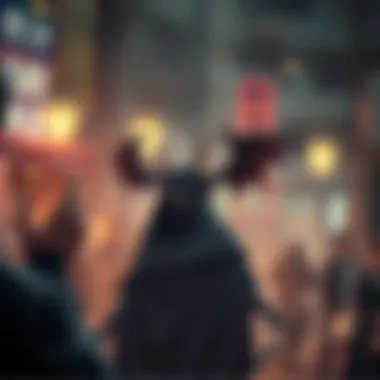

In closing, analyzing the cultural reflections embedded in demon deals enriches our understanding of anime. It becomes clear that these seemingly outlandish contracts question our relationship with authority, desire, and morality, placing them firmly in the contemporary context even as they draw from ancient roots.
Viewer Reception of Demon Deal Narratives
Understanding how audiences respond to demon deal narratives contributes to appreciating their impact within anime. The concept of making a deal with a demon inherently raises questions about morality, choice, and the consequences of those choices. This emotional and philosophical engagement is essential because it helps create dialogues not only among fans but also within academic circles that explore media influence on culture and society.
Audience Engagement and Analysis
The charm of demon deals lures viewers in with complex characters and morally ambiguous situations, generating a strong emotional investment. For example, in Devilman Crybaby, viewers see Akira Fudo grappling with his newfound powers at a great personal cost. This engagement is meaningful—each decision resonates and forces the viewers to reflect on their own values. Audience discussions often center around the characters’ motivations and the perceived fairness of their deals. The vagueness of what the characters sacrifice versus what they gain makes it a topic ripe for debate in forums like Reddit.
- Key factors in audience engagement:
- Empathy for Characters: Satisfaction comes from understanding a character's struggle.
- Moral Complexity: Viewers often debate the ethics involved, which can enhance their connection to the narrative.
- Personal Reflection: The works act as mirrors, prompting viewers to contemplate their own life choices.
Moreover, social media acts as a platform for engagement. Fans share fan art and theories, which collaboratively deepen the experience. The shared narratives create community bonds, making viewing a collective experience rather than just passive consumption.
Critical Reception in Reviews
Critics often highlight how well anime handle the theme of demon deals, offering insights into narrative effectiveness and character development. Reviews in platforms such as MyAnimeList or AnimeNewsNetwork evaluate how series like Blue Exorcist weave these themes into their plots, emphasizing both the horror and allure of striking such deals.
"Demon deals challenge characters and viewers alike, making them confront their deepest fears and desires, shaping unforgettable stories in anime."
The critical discourse tends to reflect a dichotomy. Some critics marvel at the innovative narrative structures these deals create, while others might be less favorable—criticizing perceived clichés or predictable outcomes. Nonetheless, this conversation shapes how the anime is received culturally. Discussions often range from praises for emotional depth to critiques of superficiality, showcasing the varied interpretations among viewers.
Comparative Analysis with Other Media
Understanding demon deals in anime requires a lens that branches beyond the screen. Analyzing these motifs within the broader landscape of literature and film reveals the deeper narrative roots and universal themes that bind these stories together. The significance of this comparative view lies in recognizing patterns and modifications in how societies interpret the concept of a deal with the dark.
Demon Deals in Literature and Film
Historically, literature has been rife with stories of pacts made with demonic forces. Take Faust, for instance; Goethe's classic introduces readers to a man who, in a moment of desperation, makes a deal with the devil for knowledge and pleasure. This literary archetype sets a precedent that echoes through anime, forging an unmistakable bond between the two.
Key Points:
- Thematic Similarities: Both anime and classic literature often explore the themes of ambition, greed, and regret. In Fullmetal Alchemist, the Elric brothers make a trade with a homunculus, mirroring Faust’s quest for more than what is attainable.
- Character Arcs: In film, characters are frequently portrayed as flawed individuals who seek power or redemption through their deals. Films like The Devil's Advocate follow this trajectory, a pattern that can also be traced in characters like Shogo in Kyoukai no Kanata, illustrating the duality of human nature.
- Moral Consequences: Both mediums reveal consequences tied to demon deals. The tragedy of characters is often amplified, as seen in Death Note, where Light Yagami’s quest for a god-like persona leads him down a dark path, a reflection of classic literary cautionary tales.
Evolution Across Different Media
The evolution of demon deals across various media highlights the adaptability of this motif. As audiences shift and grow, so too does the portrayal of these dark bargains. From the folktales of yesteryear to modern anime series, the underlying concept retains relevancy, though its manifestation may differ.
Notable Changes:
- Cultural Adaptations: Earlier representations often bore the weight of moral lessons. Anime embraces these narratives but often twists them to reflect contemporary issues, such as identity and technology. In Paranoia Agent, the concept of escapism through deals morphs into a commentary on societal pressures.
- Character Complexity: The characters involved in these deals have not remained static. With evolving social norms, characters now often reflect a spectrum of motivations and backgrounds, allowing for greater depth. Consider the deft portrayal of Akira, where the allure of power is juxtaposed with dire consequences, thus reflecting a richer narrative.
- Narrative Techniques: Modern storytelling in anime has transformed significantly due to technology and audience expectations. Demon deals often serve as a vehicle to explore psychological dimensions. In series like Danganronpa, the mechanization of betrayals allows deeper engagement with moral ambiguity, pushing boundaries beyond those established in literature or traditional film narratives.
Future Perspectives on Demon Deals in Anime
The exploration of demon deals continues to evolve within the realm of anime, unlocking fresh narratives and insights that resonate with audiences globally. As we look ahead, it becomes evident that the significance of these exchanges is set to expand, revealing a more intricate tapestry of character development, themes, and cultural reflections. This section aims to explore some vital elements, benefits, and various considerations surrounding the future of demon deals in anime.
Evolving Storytelling Techniques
The narrative technique employed in presenting demon deals has shown a remarkable evolution. Traditional depictions often relied on obvious moral dichotomies—good versus evil. However, as anime continues to mature, creators are beginning to weave in more nuanced storytelling. Instead of a simple black-and-white moral framework, future narratives might explore the spectrum of gray areas, compelling characters to grapple with their choices in relation to interpersonal relationships and broader societal implications.
With advancements in animation technology and storytelling platforms, we can anticipate:
- Interactive narratives: Imagine a series where viewers influence the outcome of character deals, turning passive consumption into an active experience.
- Cross-genre experimentation: The integration of demon deals in various genres such as slice-of-life or romance can provide a fresh spin, creating compelling conflicts that hadn’t been explored widely before.
- Diverse character arcs: Future productions may delve deeper into side characters, allowing for the exploration of supporting roles which can, in turn, expand the narrative universe.
Potential Shifts in Representation
As the anime industry continues to reflect the complexities of modern life and culture, we can expect a shift towards more varied representations of demon deals. These changes can enhance the richness of stories and broaden their appeal. Room exists for a more inclusive approach that recognizes a diversity of perspectives and backgrounds in the narrative. This transformation may involve:
- Multifaceted demon characters: Rather than purely antagonistic forces, demons could be developed with intricate backstories that allow audiences to empathize with them, blurring the lines between villainy and complexity.
- Cultural interpretations: Different cultures have unique notions of demons and spirits. Future anime may delve into these mythological variations, offering unique takes that go beyond the traditional Japanese narrative framework, thus broadening the cultural landscape within the medium.
- Discussion on morality: As society becomes more cognizant of issues like mental health and personal agency, future stories might engage with these topics through the lens of demonic contracts, enabling discussions that resonate deeply with contemporary viewers.
"Demon deals are not just about contracts; they mirror our real-life dilemmas about choice, consequence, and the nature of good and evil."
In sum, the future of demon deals in anime is teeming with possibility. The direction these narratives take may be shaped by the very same societal changes that influence the audience configurations and creative intentions in the anime industry. Considering the ever-expanding horizons of storytelling, it is not just about making connections with the audience but truly understanding the underlying narrative meanings that come with these otherworldly contracts.




